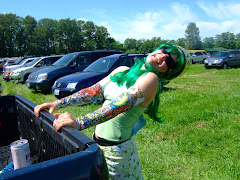 The Myth of Multitasking: How “Doing it All” Gets Nothing Done. © 2008 by Dave Crenshaw.
The Myth of Multitasking: How “Doing it All” Gets Nothing Done. © 2008 by Dave Crenshaw.Perhaps you’ve asked yourself, “Hey, what should I do now that I’ve been awakened at 2 a.m. by my sick dog and I’ve got all the barf cleaned up and now have insomnia?” Such was the question I asked my own self on Friday night after taking care of the residue Frida left on the floor after consuming what looked to be a plastic water bottle, part of a foam ball, and a significant portion of the cat’s food. Oh, the glamour of dog-momming.
So, in the hour that I lay awake, I read Dave Crenshaw’s short book, The Myth of Multitasking, which was completely doable, since it’s only 138 pages long and told as a parable (think Who Stole My Cheese; The One-Minute Manager, etc.).
The story illustrates Crenshaw’s position that multitasking is, for all its hype, an inefficient way
 to attempt tasks, run businesses, and relate to people. In fact, he argues, multi-tasking damages productivity and destroys relationships. We think we can do multiple things at one time, but in truth, we cannot, and what we call “multi-tasking” is actually “switch-tasking”—the process of constantly shifting our focus from one activity to another. Most switch-tasking occurs as we attempt to manage interruptions—phone calls, emails, IMs, people visiting our offices, dogs barfing when we're trying to sleep. All of this adds up to a huge loss in productivity—as much as 28% of the work day for the average person.
to attempt tasks, run businesses, and relate to people. In fact, he argues, multi-tasking damages productivity and destroys relationships. We think we can do multiple things at one time, but in truth, we cannot, and what we call “multi-tasking” is actually “switch-tasking”—the process of constantly shifting our focus from one activity to another. Most switch-tasking occurs as we attempt to manage interruptions—phone calls, emails, IMs, people visiting our offices, dogs barfing when we're trying to sleep. All of this adds up to a huge loss in productivity—as much as 28% of the work day for the average person. More important than the loss in productivity, however, is the damage that switch-tasking does to our relationships. (Ever been with someone who's texting while you're at the dinner table? Feels warm and cozy, huh?) “The people we live with and work with on a daily basis deserve our full attention,” Crenshaw writes. “When we give people segmented attention, piecemeal time, switching back and forth, the switching cost is higher than just the time involved. We end up damaging relationships.”
We’ve been led to believe that we can accomplish multiple tasks at a time, that it is better or more efficient to do many things at once, and that in order to stay on top of our many obligations, we must multi-task. Not so, Crenshaw argues. “No matter how effective you are at switch-tasking, you are still working less efficiently…you are going to take longer to get things done than the person who focuses on one attention-requiring activity at a time.” A simple experiment helps demonstrate this point, and Crenshaw includes additional worksheets and tips for making better use of your time...all day long, not just in the middle of the night.

1 comment:
Hmm . . . so the author wouldn't agree that my commenting on your blog while I'm meant to be working on other things is particularly efficient? Bummer.
Jen
Post a Comment